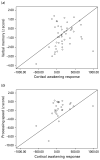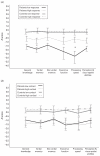Abnormal cortisol awakening response predicts worse cognitive function in patients with first-episode psychosis
- PMID: 20529412
- PMCID: PMC3513413
- DOI: 10.1017/S0033291710001170
Abnormal cortisol awakening response predicts worse cognitive function in patients with first-episode psychosis
Abstract
Background: Cognitive impairment, particularly in memory and executive function, is a core feature of psychosis. Moreover, psychosis is characterized by a more prominent history of stress exposure, and by dysregulation of the hypothalamic-pituitary-adrenal (HPA) axis. In turn, stress exposure and abnormal levels of the main HPA axis hormone cortisol are associated with cognitive impairments in a variety of clinical and experimental samples; however, this association has never been examined in first-episode psychosis (FEP).
Method: In this study, 30 FEP patients and 26 controls completed assessment of the HPA axis (cortisol awakening response and cortisol levels during the day), perceived stress, recent life events, history of childhood trauma, and cognitive function. The neuropsychological battery comprised general cognitive function, verbal and non-verbal memory, executive function, perception, visuospatial abilities, processing speed, and general knowledge.
Results: Patients performed significantly worse on all cognitive domains compared to controls. In patients only, a more blunted cortisol awakening response (that is, more abnormal) was associated with a more severe deficit in verbal memory and processing speed. In controls only, higher levels of perceived stress and more recent life events were associated with a worse performance in executive function and perception and visuospatial abilities.
Conclusions: These data support a role for the HPA axis, as measured by cortisol awakening response, in modulating cognitive function in patients with psychosis; however, this association does not seem to be related to the increased exposure to psychosocial stressors described in these patients.
Figures


References
-
- APA . Diagnostic and Statistical Manual of Mental Disorders. American Psychiatric Association; Washington, DC: 2000.
-
- Backhaus J, Junghanns K, Born J, Hohaus K, Faasch F, Hohagen F. Impaired declarative memory consolidation during sleep in patients with primary insomnia: influence of sleep architecture and nocturnal cortisol release. Biological Psychiatry. 2006;60:1324–1330. - PubMed
-
- Backhaus J, Junghanns K, Hohagen F. Sleep disturbances are correlated with decreased morning awakening salivary cortisol. Psychoneuroendocrinology. 2004;29:1184–1191. - PubMed
-
- Bebbington P, Nayani T. The psychosis screening questionnaire. International Journal of Methods in Psychiatric Research. 1995;5:11–19.
-
- Bebbington PE, Bhugra D, Brugha T, Singleton N, Farrell M, Jenkins R, Lewis G, Meltzer H. Psychosis, victimisation and childhood disadvantage: evidence from the second British National Survey of Psychiatric Morbidity. British Journal of Psychiatry. 2004;185:220–226. - PubMed
Publication types
MeSH terms
Substances
Grants and funding
LinkOut - more resources
Full Text Sources
Medical

